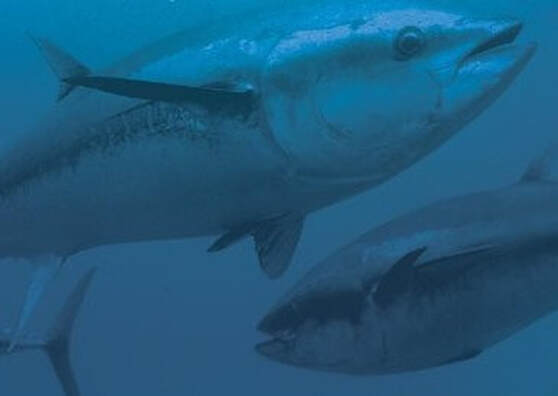THE END OF THE LINE
***
Director: Rupert Murray
Screenwriter: Based on the eponymous novel by Charles Clover
Principal cast:
Ben Bradshaw
Robert Mielgo Bragazzi
Haidar El Ali
John Crosbie
Ted Danson (voice)
Charles Clover
Country: UK
Classification: G
Runtime: 85 mins.
Australian release date: 13 May 2010
Millions of people around the world depend on fish as part of their staple diet. Rupert Murray’s documentary, The End of the Line, based on a book by the journalist Charles Clover, reveals the devastating impact that fishing has, and continues to have, on oceans around the world. It poses the question, ‘Imagine a world without fish?’
It’s not the weekend fishermen who are the problem, but the large fishing companies who plunder the seabed with their massive trawling operations. The destruction caused by a single trawl has been described as having the same effect as ploughing a field seven times a year.
The documentary takes us on a journey from the Straits of Gibraltar to the coasts of Senegal and Alaska and on to the Tokyo Fish Market. There are statements made by Clover and Roberto Mielgo Bragazzi (a tuna fisherman turned whistle-blower), which bring to light the corruption, greed and total disregard for the damage these companies are doing to the oceans.
There is a lot of evidence given and one example which resonates is the impact that over-fishing in Newfoundland has had on almost wiping out cod. The Canadian Government imposed a moratorium in 1992, in an attempt to allow the species to regenerate, alas, as in all good horror stories, the species was eventually overrun by another, once their predators disappeared. And, what did the fisherman do? You guessed it; they just changed their supply…
The documentary commences with a rousing score in the opening credits and this is accompanied with rather blood thirsty scenes of fish being slaughtered. It does, however, present a case for reversing the predicament and rightly states that we need to re-think our ideology. If something is done now, then perhaps we will avoid mass starvation in the future, by the year 2050.
It all seems like a good idea, but the documentary also shows how disregard is at the forefront of human nature. The up-market restaurant Nobu marks bluefin tuna on their menu as an endangered species. The media spin simply quoted, ‘it is, after all, up to individuals to make up their own minds’. We can only live in the hope that would be enough to put their customers off! Jamie Oliver, on the other hand, managed to eliminate all mention of bluefin from previous recipes.
The End of the Line is a balanced film which could easily be included in school curriculums. It should also, like many documentaries dealing with environmental issues, be necessary viewing for the rest of the planet. The message would encourage those who believe that, ‘a loss of fish is a loss of soul,’ to push for a global network of marine reserves.
Screenwriter: Based on the eponymous novel by Charles Clover
Principal cast:
Ben Bradshaw
Robert Mielgo Bragazzi
Haidar El Ali
John Crosbie
Ted Danson (voice)
Charles Clover
Country: UK
Classification: G
Runtime: 85 mins.
Australian release date: 13 May 2010
Millions of people around the world depend on fish as part of their staple diet. Rupert Murray’s documentary, The End of the Line, based on a book by the journalist Charles Clover, reveals the devastating impact that fishing has, and continues to have, on oceans around the world. It poses the question, ‘Imagine a world without fish?’
It’s not the weekend fishermen who are the problem, but the large fishing companies who plunder the seabed with their massive trawling operations. The destruction caused by a single trawl has been described as having the same effect as ploughing a field seven times a year.
The documentary takes us on a journey from the Straits of Gibraltar to the coasts of Senegal and Alaska and on to the Tokyo Fish Market. There are statements made by Clover and Roberto Mielgo Bragazzi (a tuna fisherman turned whistle-blower), which bring to light the corruption, greed and total disregard for the damage these companies are doing to the oceans.
There is a lot of evidence given and one example which resonates is the impact that over-fishing in Newfoundland has had on almost wiping out cod. The Canadian Government imposed a moratorium in 1992, in an attempt to allow the species to regenerate, alas, as in all good horror stories, the species was eventually overrun by another, once their predators disappeared. And, what did the fisherman do? You guessed it; they just changed their supply…
The documentary commences with a rousing score in the opening credits and this is accompanied with rather blood thirsty scenes of fish being slaughtered. It does, however, present a case for reversing the predicament and rightly states that we need to re-think our ideology. If something is done now, then perhaps we will avoid mass starvation in the future, by the year 2050.
It all seems like a good idea, but the documentary also shows how disregard is at the forefront of human nature. The up-market restaurant Nobu marks bluefin tuna on their menu as an endangered species. The media spin simply quoted, ‘it is, after all, up to individuals to make up their own minds’. We can only live in the hope that would be enough to put their customers off! Jamie Oliver, on the other hand, managed to eliminate all mention of bluefin from previous recipes.
The End of the Line is a balanced film which could easily be included in school curriculums. It should also, like many documentaries dealing with environmental issues, be necessary viewing for the rest of the planet. The message would encourage those who believe that, ‘a loss of fish is a loss of soul,’ to push for a global network of marine reserves.
